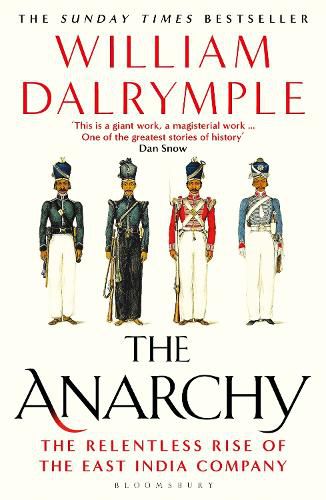Readings Newsletter
Become a Readings Member to make your shopping experience even easier.
Sign in or sign up for free!
You’re not far away from qualifying for FREE standard shipping within Australia
You’ve qualified for FREE standard shipping within Australia
The cart is loading…






In August 1765 the East India Company defeated and captured the young Mughal emperor and forced him to set up in his richest provinces a new government run by English traders who collected taxes through means of a vast and ruthless private army.
The creation of this new government marked the moment that the East India Company ceased to be a conventional international trading corporation, dealing in silks and spices, and became something much more unusual: an aggressive colonial power in the guise of a multinational business. In less than half a century it had trained up a private security force of around 260,000 men - twice the size of the British army - and had subdued an entire subcontinent, conquering first Bengal and finally, in 1803, the Mughal capital of Delhi itself. The Company’s reach stretched relentlessly until almost all of India south of the Himalayas was effectively ruled from a boardroom in London.
The Anarchy tells the remarkable story of how one of the world’s most magnificent empires disintegrated and came to be replaced by a dangerously unregulated private company, based thousands of miles overseas and answerable only to its shareholders. In his most ambitious and riveting book to date, William Dalrymple tells the story of the East India Company as it has never been told before, unfolding a timely cautionary tale of the first global corporate power.
Three hundred and fifteen years after its founding, with a corporate Mogul now sitting in the White House, the story of the East India Company has never been more current.
$9.00 standard shipping within Australia
FREE standard shipping within Australia for orders over $100.00
Express & International shipping calculated at checkout
In August 1765 the East India Company defeated and captured the young Mughal emperor and forced him to set up in his richest provinces a new government run by English traders who collected taxes through means of a vast and ruthless private army.
The creation of this new government marked the moment that the East India Company ceased to be a conventional international trading corporation, dealing in silks and spices, and became something much more unusual: an aggressive colonial power in the guise of a multinational business. In less than half a century it had trained up a private security force of around 260,000 men - twice the size of the British army - and had subdued an entire subcontinent, conquering first Bengal and finally, in 1803, the Mughal capital of Delhi itself. The Company’s reach stretched relentlessly until almost all of India south of the Himalayas was effectively ruled from a boardroom in London.
The Anarchy tells the remarkable story of how one of the world’s most magnificent empires disintegrated and came to be replaced by a dangerously unregulated private company, based thousands of miles overseas and answerable only to its shareholders. In his most ambitious and riveting book to date, William Dalrymple tells the story of the East India Company as it has never been told before, unfolding a timely cautionary tale of the first global corporate power.
Three hundred and fifteen years after its founding, with a corporate Mogul now sitting in the White House, the story of the East India Company has never been more current.
Given the dastardly activities of some of our massive corporations of today, the antics containedwithin William Dalrymple’s latest offering shouldn’t really come as a huge shock to readers. I say they shouldn’t, but I blanched several times reading this. Hot on the heels of Koh-I-Noor, which was jointly written with Anita Anand, The Anarchy documents the rise of the British East India Company (EIC), over two centuries from 1599 (Elizabethan-era) to 1799.
Basically, when the Brits weren’t going to get anywhere near the mercantile action that the rival Dutch East India Company (VOC) had cornered across South-East Asia, the EIC looked elsewhere: to the Indian subcontinent and its myriad empires, notably the Mughal Empire, and then further afield again. If you’ve seen the fabulous series Taboo, you’ll remember the wheelings and dealings of the EIC to maintain their monopoly and court favour with the monarchy to protect interests in North America. This book is full of historical megalomaniacs whose lust for moneyand power proved catastrophic for India, directly leading to the British annexation of India and, much later, of Hong Kong. The raison d’être of making money and then obtaining power was at the core of EIC operations in the eighteenth century. The EIC amassed an army of a size twicethat of the British Army, and regularly engaged in conflict with rivals including the French East India Company.
Rich in characters and detail, The Anarchy can be read as a prequel to Koh-I-Noor (which details the acquisition o the great Mughal diamond by the British in the nineteenth century, now in the crown jewels), and a pendant to Tharoor’s Inglorious Empire. If this book takes yourfancy, also keep an eye out for Dalrymple’s forthcoming volume on paintings by Indian artists commissioned for the EIC.